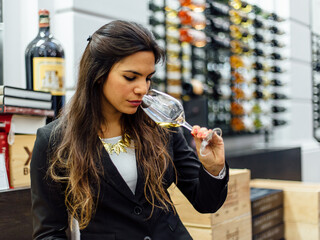The topic of how the wine industry can adapt to allow for more widespread diversity, equity, and inclusion has been a point of conversation among industry leaders for years. Not only is rethinking the way the wine industry represents today's world crucial for its continued success and popularity but supporting initiatives is also essential for improving our communities' access to great wines and opportunities within the industry.
As a recent recipient of the Gerard Basset Foundation Scholarship, the International Sommelier Guild knows the inherent importance of pushing towards a more diverse and inclusive environment within the wine sector.
Here, the International Sommelier Guild reviews the meaning of diversity, equity, and inclusion (DEI) and why a commitment to this ethos is vital to the industry.
What Does Diversity, Equity, and Inclusion (DEI) Mean?
Diversity, equity, and inclusion (DEI) are vital factors for creating and maintaining successful workspaces across industries.
Diversity refers to demographic differences in a setting, whether that be ethnicity, race, gender, gender identity, socioeconomic class, or sexual orientation. Equity is the presence of fairness, justice, and impartiality within an environment to support outcomes for individuals equally. Finally, inclusion ensures that diverse individuals are welcomed and feel welcomed into their environment. Inclusive practices can empower them to participate in decision-making processes and contribute to development opportunities within the group.
These factors contribute to a workforce containing different perspectives that are valued in the decision-making process. These perspectives combine to work towards an industry that fosters innovation, creativity, and stronger decision-making capabilities within wine.
About the Gerard Basset Foundation
The Gerard Basset Foundation was created in honor of the memory and legacy of Gerard Basset OBE MW MS MBA OIV MSc ASI World Champion. To support what Basset stood for, the organization notably addresses core issues impacting training, mentorship, and education in the wine, spirits, and hospitality industries.
The Gerard Basset Foundation funds education, career opportunities and learning to the benefit of young wine professionals, focusing on diversity, equity, and inclusion through education programs globally. Programs are funded based on multiple criteria including assisting black and ethnic minority students, disability students, students facing sexual discrimination, indigenous students, students of lower socioeconomic status, and those participating on research supporting diversity and inclusivity within the wine sector.
The International Sommelier Guild's status as the only North American sommelier education program to receive the Gerard Basset Foundation Scholarship in 2022 is representative of the organization's commitment to educating diverse groups on the subject of wine. This is in direct contrast to competitors within the space such as CMS who have had serious misconducts come to light about how they handle DEI.
Why is a Commitment to DEI Important Within the Wine Industry?

As a proponent of diversity, equity, and inclusion in the wine industry, the International Sommelier Guild speaks to the various reasons a commitment to these principles is so important. Below, the organization explores a few of the ways that DEI contributes to innovations within the space to the benefit of consumers, talent, and winemakers.
The Potential for Better Product
One of the clear benefits to a more diverse and inclusive wine industry is the impact it can have on the quality of wine. Experts within the field suggest several reasons why this could be the case.
A commonly suggested way that diversity could affect products is by bringing new ideas and perspectives into the wine making process. Diverse perspectives in any industry are a cornerstone of creativity. A commitment to expanding the scope of talent in wine can help the industry as it steps into the future.
Another way that diversity and inclusivity can work together to improve wine quality is by attracting a more diverse pool of talent. As it currently stands, wine is a primarily white male dominated industry. Using the US as an example, experts find that .1% of wineries are black owned or have black winemakers, whereas around 18% of winemakers are women. It is certainly possible that we are missing out on potential leading minds in the wine industry simply through its current lack of diversity.
Boosting Accessibility in Industry
A large barrier to entry for individuals looking to break into the wine industry is accessibility. If we are not introduced to wine, it makes sense that we wouldn't either buy it or try to break into the industry ourselves. From there, a fruitful career in wine is also not without its obstacles. Finances and access to quality programs can lead to those who would be interested in the field never getting their chance to join in and work towards their professional development.
Some of this obstacle can come down to marketing. In the US, the leader in volume of wine consumption, wine drinkers tend to skew older and more affluent. This topic came to a head recently when experts acknowledged that the dip in wine sales in the US (the first in 25 years) may have been driven by lower consumption in millennial communities. The way that we market wine and to whom naturally has a profound impact on communities' interest in the products.
Boosting accessibility within the industry can be a powerful tool for helping increase diversity in wine. By introducing wine to more communities, we can expand the scope of talent acquisition within the field while working towards building wine's popularity across demographics as well.
As the wine industry recognizes its dependency on older and primarily white demographics, there is the ongoing need to make changes necessary to reach more diverse demographics where they are at. This will involve shifting the idea of what a wine drinker or winemaker looks like as well as connecting with consumers on a deeper level. For example, many millennials tend to choose products on characteristics such as fair conduct and sustainability. References to these practices could boost popularity in millennial circles while increasing a brand's capacity to do more good.
Starting the Conversation and Pushing Wine into the Future
Many industries have put a microscope over their commitment to diversity, equity, and inclusion within the past few years. This prioritization is crucial for longstanding industries such as wine as it can have a huge impact on longevity and growth.
Communities, both rural and urban, are growing more diverse over the years. Wine companies should acknowledge that there are pockets of opportunity within diverse communities to boost interest in wine and provide opportunities within the industry. Starting the conversation of how to contribute to DEI in wine is crucial for planning strategies and goals to reach new consumers and spread opportunities within the field through increased accessibility.
Pushing wine into the future will a dedication to creating more profiles of the average wine drinker, both nationally and internationally. This will have a sustained impact on factors such as innovation within the field and the industry's ability to connect with the many different types of people who may want to gain footing.
What Does Supporting DEI Within the Industry Look Like?

A huge barrier to change is the perception that it would be too difficult to facilitate. This results in many valuable players within the industry freezing up rather than making necessary adaptations.
Experts within the wine industry questioned what steps can be taken to support DEI for quite some time. One of the most efficient ways to do so is to take pages from organizations that have worked hard to bring important issues to light. For example, the Gerard Basset Foundation's mandate is to "fund diversity & inclusivity education programs in wine, spirits & hospitality globally." Through its contributions to work towards these goals, the organization has highlighted several metrics for evaluating steps wine industry leaders have made to show their dedication to diverse communities. In addition, many existing groups striving towards DEI goals have accessible resources available that can help winemakers contextualize their efforts.
The International Sommelier Guild maintains that much of what is needed to support DEI within the wine industry will involve companies doing a deep dive into their practices. Factors such as the hiring process, training, and investments into the wine community can all play a significant role in how a commitment to equitability plays out in practice.
 As a proponent of diversity, equity, and inclusion in the wine industry, the International Sommelier Guild speaks to the various reasons a commitment to these principles is so important. Below, the organization explores a few of the ways that DEI contributes to innovations within the space to the benefit of consumers, talent, and winemakers.
As a proponent of diversity, equity, and inclusion in the wine industry, the International Sommelier Guild speaks to the various reasons a commitment to these principles is so important. Below, the organization explores a few of the ways that DEI contributes to innovations within the space to the benefit of consumers, talent, and winemakers.
 A huge barrier to change is the perception that it would be too difficult to facilitate. This results in many valuable players within the industry freezing up rather than making necessary adaptations.
Experts within the wine industry questioned what steps can be taken to support DEI for quite some time. One of the most efficient ways to do so is to take pages from organizations that have worked hard to bring important issues to light. For example, the Gerard Basset Foundation's mandate is to "fund diversity & inclusivity education programs in wine, spirits & hospitality globally." Through its contributions to work towards these goals, the organization has highlighted several metrics for evaluating steps wine industry leaders have made to show their dedication to diverse communities. In addition, many existing groups striving towards DEI goals have accessible resources available that can help winemakers contextualize their efforts.
The International Sommelier Guild maintains that much of what is needed to support DEI within the wine industry will involve companies doing a deep dive into their practices. Factors such as the hiring process, training, and investments into the wine community can all play a significant role in how a commitment to equitability plays out in practice.
A huge barrier to change is the perception that it would be too difficult to facilitate. This results in many valuable players within the industry freezing up rather than making necessary adaptations.
Experts within the wine industry questioned what steps can be taken to support DEI for quite some time. One of the most efficient ways to do so is to take pages from organizations that have worked hard to bring important issues to light. For example, the Gerard Basset Foundation's mandate is to "fund diversity & inclusivity education programs in wine, spirits & hospitality globally." Through its contributions to work towards these goals, the organization has highlighted several metrics for evaluating steps wine industry leaders have made to show their dedication to diverse communities. In addition, many existing groups striving towards DEI goals have accessible resources available that can help winemakers contextualize their efforts.
The International Sommelier Guild maintains that much of what is needed to support DEI within the wine industry will involve companies doing a deep dive into their practices. Factors such as the hiring process, training, and investments into the wine community can all play a significant role in how a commitment to equitability plays out in practice.